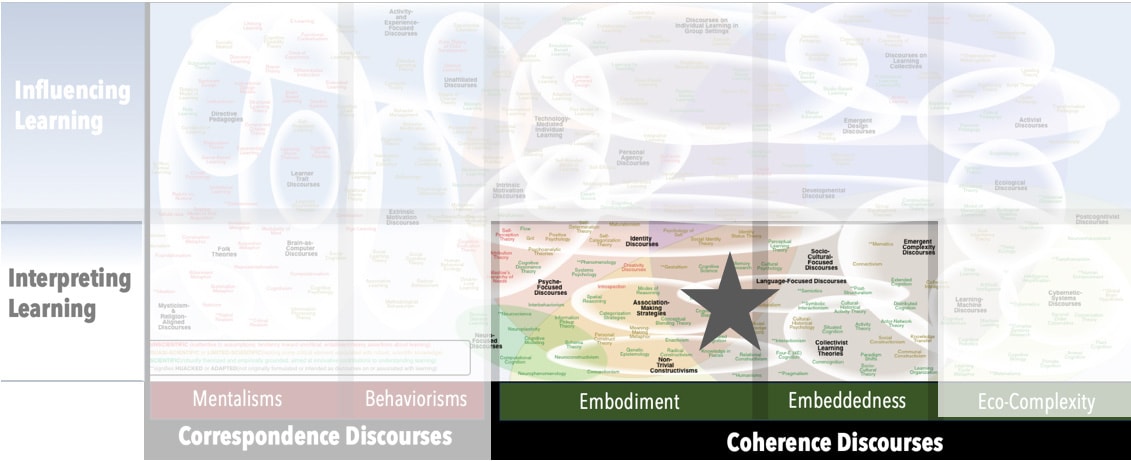Focus
Attending to the collective aspects of human knowledge, activity, and identityPrincipal Metaphors
- Knowledge is … language-encoded systems of meaning/signification
- Knowing … one’s system of meaning/signification
- Learner is … a languaging agent
- Learning is … participating in and evolving (systems of meaning/signification)
- Teaching is … enculturating (into systems of meaning/signification)
Originated
1960sSynopsis
Language-Focused Discourses attend to the role of symbol systems in constituting and maintaining knowers’ realities, as well as to their role is enabling and constraining personal possibilities within those realities. Associated discourses include:- Cognitive Linguistics (Noam Chomsky, George Lakoff, Ronald Langacker, 1980s) – a branch of Cognitive Science in which linguistics figures prominently. Cognitive Linguistics is subject to varied and conflicting definitions, but it is most often associated with perspectives represented in the Language-Focused Discourses cluster on this site, especially Conceptual Metaphor Theory, Structuralism, and Semiotics. Other types of Cognitive Linguistics include:
- Formal Linguistics – an approach to the study of language and meaning in which mathematical methods are used to analyze and model natural languages
- Functional Linguistics – an approach to the study of language and meaning oriented by Structuralism and Pragmatism, in which language is regarded as a tool and so best examined in terms of its functions and effectiveness. Branches include:
- Systemic Functional Linguistics (Michael Halliday, 1960s) – a form of Functional Linguistics in which any act of communication (i.e., meaning) is regarded as choice-making, and language is regarded as a complex system (see Complex Systems Research) of interrelated choices
- Generative Grammar (Generativism) – an umbrella category that includes dozens of theories of language and meaning that combine Structuralism and Biological Determinism (see Determinisms), leading to the principle that a language comprises a system of rules that is innate to the human brain and that can be used to generate any number of plausible statements
- Neuro-Linguistic Programming (Richard Bandler, John Grinder, 1970s) – an approach that aims to help individuals change negative patterns, enhance personal effectiveness, and improve interpersonal communication by focusing on the relationships among neurological processes, language, and behavioral patterns
- Psycholinguistics (Psychology of Language) – an area of study focused on the cognitive processes that enable humans to create, learn, and use language. Contributing domains include Cognitive Science, Neuroscience, and Developmental Discourses.
- Ethnolinguistics (Anthropological Linguistics) – the interdisciplinary study of how language reflects, shapes, and carries cultural practices, beliefs, values, and social structures
Commentary
The most extreme versions of Language-Focused Discourses are sometimes interpreted as asserting that all reality is linguistically effected. However, almost all Language-Focused Discourses are more modest in their claims. All contend that language influences perception, interpretation, and action. That is, these discourses are rarely interested in debating whether there’s a reality out there; they’re more concerned with interpretations of reality.Subdiscourses:
- Cognitive Linguistics
- Ethnolinguistics (Anthropological Linguistics)
- Formal Linguistics
- Functional Linguistics
- Generative Grammar (Generativism)
- Neuro-Linguistic Programming
- Psycholinguistics (Psychology of Language)
- Systemic Functional Linguistics
Map Location

Please cite this article as:
Davis, B., & Francis, K. (2025). “Language-Focused Discourses” in Discourses on Learning in Education. https://learningdiscourses.com.
⇦ Back to Map
⇦ Back to List
